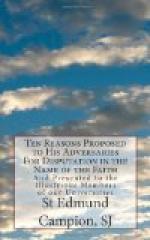Time would fail me were I to try to count up the Epistles, Sermons, Homilies, Orations, Opuscula and dissertations of the Fathers, in which they have laboriously, earnestly and with much learning supported the doctrines of us Catholics. As long as these works are for sale at the booksellers’ shops, it will be vain to prohibit the writings of our controversialists; vain to keep watch at the ports and on the sea-coast; vain to search houses, boxes, desks, and book-chests; vain to set up so many threatening notices at the gates. No Harding, nor Sanders, nor Allen, nor Stapleton, nor Bristow, attack these new-fangled fancies with more vigour than do the Fathers whom I have enumerated. As I think over these and the like facts, my courage has grown and my ardour for battle, in which whatever way the adversary stirs, unless he will yield glory to God, he will be in straits. Let him admit the Fathers, he is caught: let him shut them out, he is undone.
When we were young men, the following incident occurred. John Jewell, a foremost champion of the Calvinists of England, with incredible arrogance challenged the Catholics at St. Paul’s, London, invoking hypocritically and calling upon the Fathers, who had flourished within the first six hundred years of Christianity. His wager was taken up by the illustrious men who were then in exile at Louvain, hemmed in though they were with very great difficulties by reason of the iniquity of their times. I venture to assert that that device of Jewell’s, stupid, unconscionable, shameless as it was, qualities which those writers happily brought out, did so much good to our countrymen that scarcely anything in my recollection has turned out to the better advantage of the suffering English Church. At once an edict is hung up on the doors, forbidding the reading or retaining of any of those books, whereas they had come out, or were wrung out, I may almost say, by the outcry that Jewell had raised. The result was that all the persons interested in the




